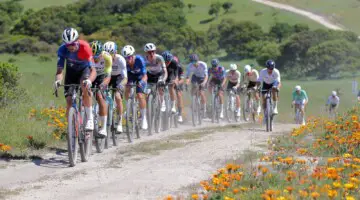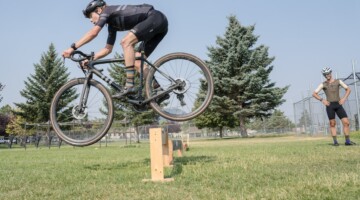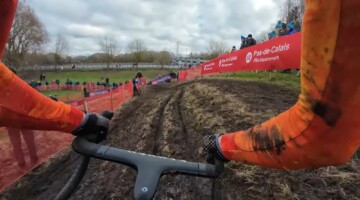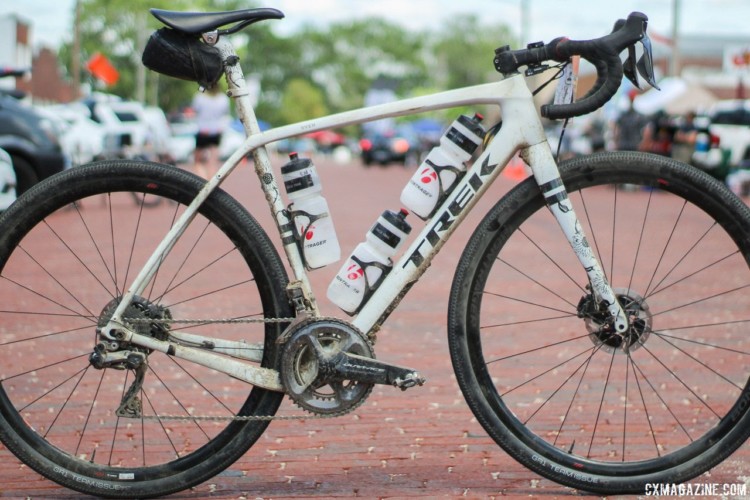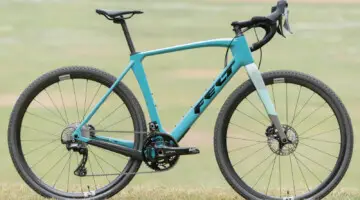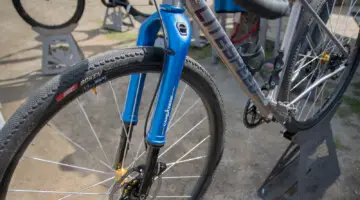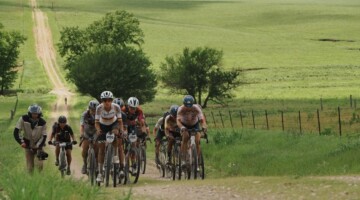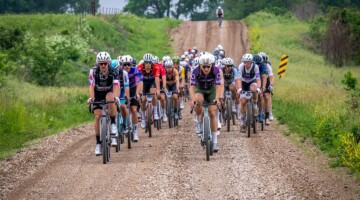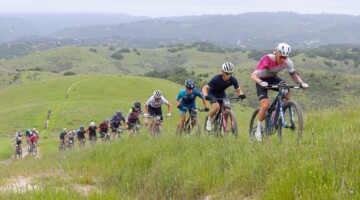
Our coverage of the 2018 Dirty Kanza 200 is brought to you in part by Panaracer. Check out its line of gravel tires for your next adventure.
During his post-retirement years as a brand ambassador for Trek Bikes, Belgian cyclocross legend Sven Nys has shown a knack for putting on a good show. He stole the show at the 2016 SSCXWC on a custom single speed Trek Crockett and then hopped in a Cat 4 race in Chicago last fall.
This year, Nys turned his sights on a challenge a bit more out of his wheelhouse: gravel. Rumors about Nys’ gravel desires were verified last month when his nom de guerre Stanley Nice appeared on the Dirty Kanza 200 start list.
According to Nys, it did not take much convincing to head to Kansas’ Flint Hills. “We have a new bike and we want to promote it,” Nys said. “If you want to promote a new gravel bike then you need to come to the Dirty Kanza. That’s normal. I said okay, I want to do it together with Jens.”
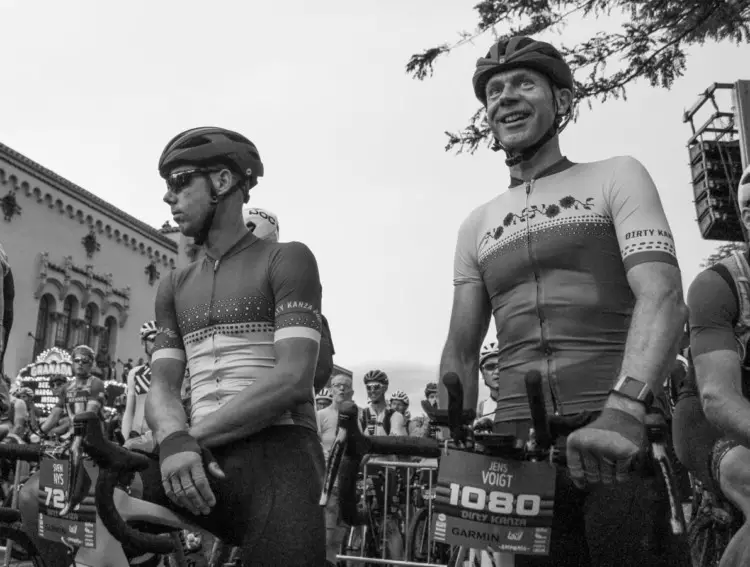
Sven Nys and Jens Voigt wait to tackle their first Dirty Kanza 200. 2018 Men’s Dirty Kanza 200. © Z. Schuster / Cyclocross Magazine
The new bike is Trek’s Checkpoint gravel platform it released earlier this year. When I caught up with Nys at Checkpoint 3 in Madison after he had to abandon the race due to stomach issues caused by his rough travel schedule, it was Cyclocross Magazine‘s first look at the new gravel bike. Nys’ Kansas trip included testing some new Challenge tubeless gravel tires as well.
Read on for a profile of Nys’ Dirty Kanza 200 Checkpoint and the story of how his encounters with the famed and feared Kanza gravel went.
Sven Nys’ DK200 Trek Checkpoint Frame and Build
Although Nys’ ride at the Dirty Kanza was a rough one thanks to flat tires and stomach issues complicated by a tight travel schedule, he likely felt at home on the Checkpoint platform. I spoke with Trek project manager David Studner about the project, and he explained the company’s goal. “With a World-Cup-proven Boone geometry already in our stable, we knew that not much more off-road capability was needed from a geometry standpoint. We sought to add a touch more stability without losing any of Boone’s sweet handling.”
Nys’ 56cm Checkpoint had a head tube angle of 72.2 degrees, which is only 0.2 degrees steeper than the comparable Boone. As expected for a gravel model, the bottom bracket drops 0.8cm more on the Checkpoint than it does on the Boone. The tweaks in geometry give the Checkpoint a 58.6cm stack—0.6cm higher than the Boone—but both models share a 102cm wheelbase.
Trek offers the Checkpoint in both carbon and alloy builds. At the DK200, Nys had a carbon Checkpoint SL frameset outfitted to his liking. Trek builds the frame using its 500-series OLCV carbon (a step lower than the 600-series Boone) with 12mm thru-axles and flat mount disc brakes.
The Checkpoint frame comes in black and a hue of gray the company calls, fittingly, gravel, but Nys had his white Checkpoint custom painted for the event. Trek employee and Wisconsin single speed cyclocrosser David Cestelli personalized the bike for “Sven” and added some impressively detailed accents.
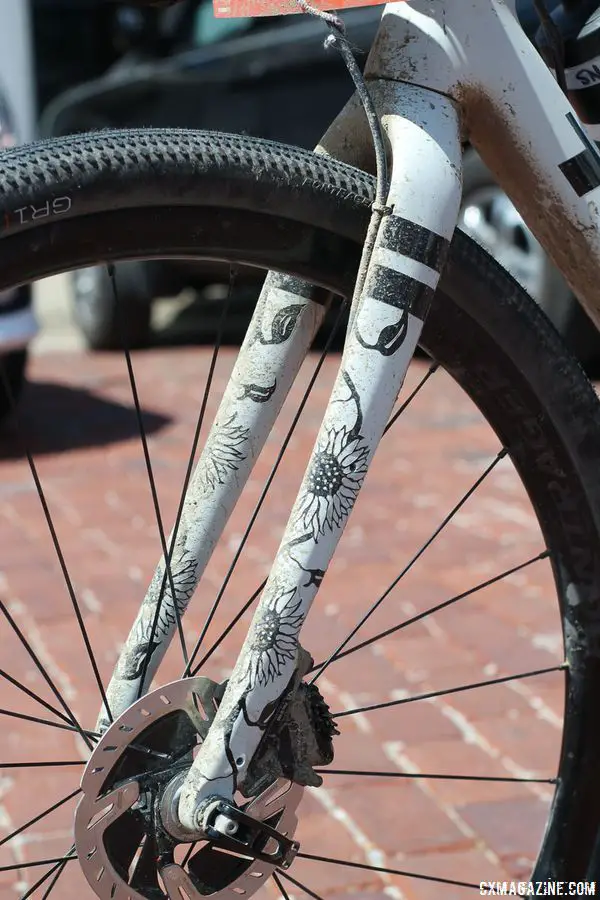
Custom ink done by Trek’s David Cestelli adorns the fork on Nys’ bike. Sven Nys’ 2018 Dirty Kanza 200 Trek Checkpoint. © Z. Schuster / Cyclocross Magazine
In a nod to the many shapes adventure can take, Trek added a plethora of mounts to the frame and fork. The rear has the standard rack and fender mounts, there are top tube bag mounts and the fork also has slots for front attachments.
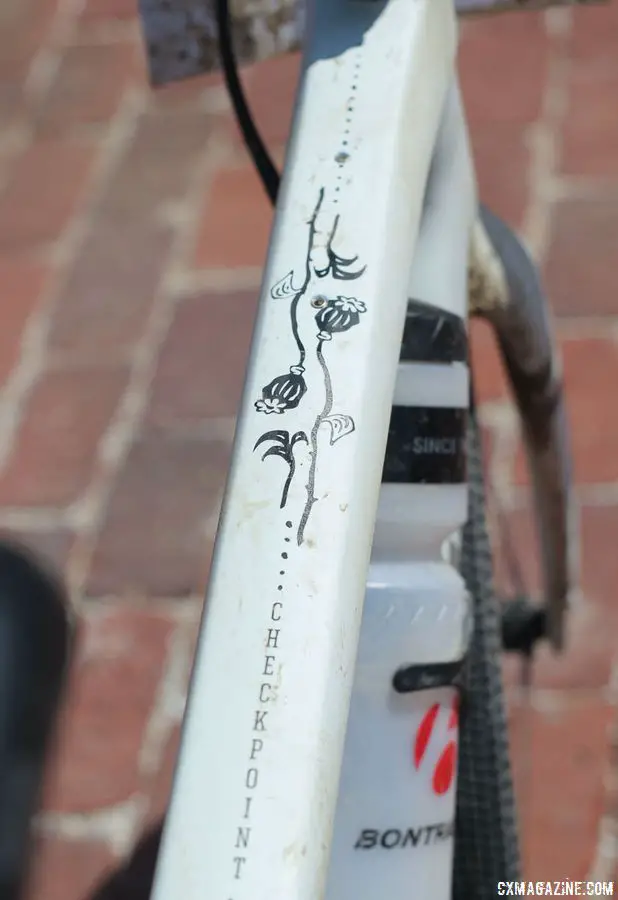
Nys’ white bike had some impressive ink done. Note the two bag mounts near the head tube. Sven Nys’ 2018 Dirty Kanza 200 Trek Checkpoint. © Z. Schuster / Cyclocross Magazine
Trek also included the adjustable Strangehold rear dropout that allows users to extend the chainstay length by 15mm from the design 42.5cm to 44.0cm if they want a longer wheel platform for touring or a more stable gravel ride. For the truly adventurous out there, the Stranglehold can also be used to convert the Checkpoint to a single speed gravel machine.
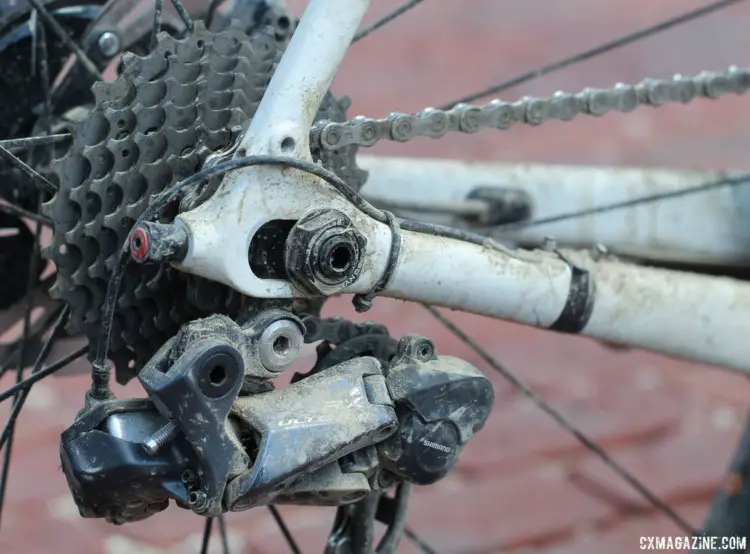
The Checkpoint uses Trek’s adjustable Stranglehold dropout that can also be run as a single speed. Sven Nys’ 2018 Dirty Kanza 200 Trek Checkpoint. © Z. Schuster / Cyclocross Magazine
One trend in the gravel market that is hard to miss these days is the addition of front and/or rear suspension to gravel-dedicated bikes. Trek has had its rear IsoSpeed decoupler on its carbon bikes for years and last year, added a front IsoSpeed to its Boone cyclocross bike. We have been impressed by the front IsoSpeed on the Boone RSL frame we currently have in review, and to us, it seemed like a natural fit for gravel.
Trek opted to include just the rear IsoSpeed on the carbon Checkpoint frame. According to the company, the benefits of the front decoupler diminish as tire sizes increase, and in its view, the best option for getting a cushier ride is to use the tried-and-true method of running higher-volume tires.
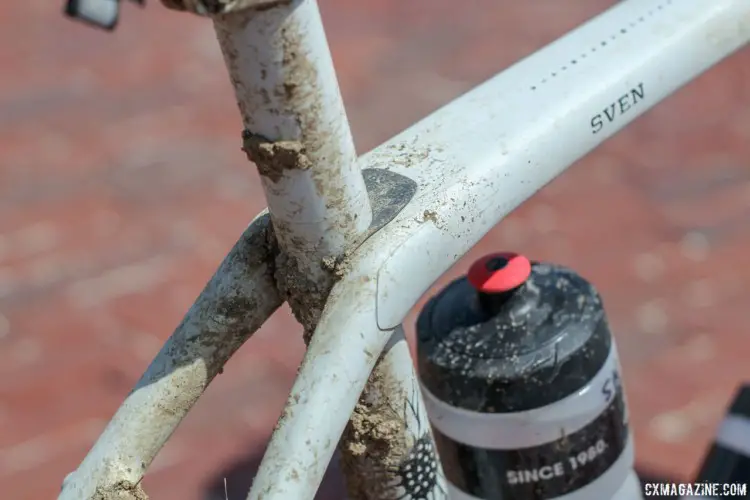
The Checkpoint has a rear IsoSpeed decoupler. The company opted to not put one in the front. Sven Nys’ 2018 Dirty Kanza 200 Trek Checkpoint. © Z. Schuster / Cyclocross Magazine
A Shimano-sponsored athlete even in retirement, Nys ran a Shimano Di2 drivetrain. His crankset was a Dura-Ace R9100 model with 50/34t front chain rings. In the rear, he ran the new Ultegra RD-RX805 clutch-based rear derailleur—which we reviewed after the Almanzo 100 gravel race—with an 11-28t cassette. The stock Checkpoint builds are a bit spinnier for us mere mortals with an 11-34t cassette in the rear. Nys paired the drivetrain with Dura-Ace ST-R9150 shift/brake levers. He stopped using hydraulic flat mount Dura-Ace calipers and 140mm IceTech Freeza rotors.
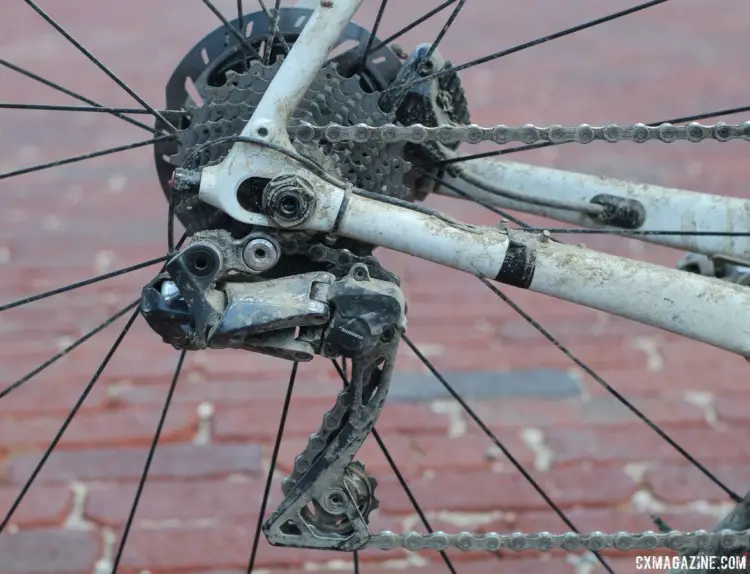
Nys ran the Ultegra RX805 Di2 clutch-based derailleur with an 11-28t cassette. The Checkpoint comes stock with an 11-34t. Sven Nys’ 2018 Dirty Kanza 200 Trek Checkpoint. © Z. Schuster / Cyclocross Magazine
Nys’ contact points were a carbon Bontrager Pro IsoCore handlebar, Bontrager Pro Serano saddle and Shimano XTR PD-M9000 SPD pedals. Seeing Nys with a stock pedal was a bit different or us, since he has usually had gram-saving, mud-shedding prototypes on his bikes during his racing days.
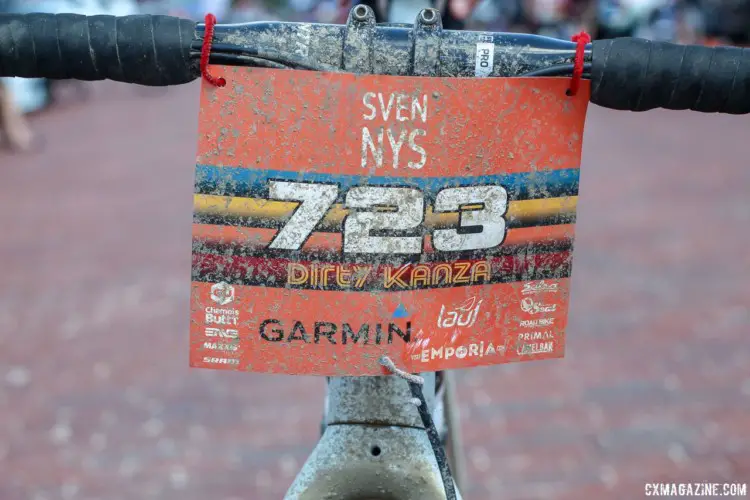
Although he registered as Stanley Nice, Nys raced under his real name on Saturday. Sven Nys’ 2018 Dirty Kanza 200 Trek Checkpoint. © Z. Schuster / Cyclocross Magazine
Sven’s DK200 Tires
After Challenge released its new tubeless ready tires this year, the company is already at work on next year’s models. And what better place to test gravel tires than the gravel roads of the Flint Hills? Challenge did some testing during the two-day La Grind event last month, and on Saturday, Nys also rode Challenge tubeless tires at the DK200.
Nys’ Checkpoint frame had plenty of room for him to run wide tires, thanks in part to the dropped drive-side chainstay we have seen on a number of other gravel bikes. “We researched heavily and the short answer was, as much as possible,” Trek’s Studner told me when I asked him how much tire clearance his team designed the Checkpoint for. The company claims clearance for up to 700c x 45mm tires.
One thing that is different about the Checkpoint versus other bikes with dropped chainstays is it’s the first we have seen that has a geometry optimized for only 700c tires and not both 700c and 650b Road Plus.
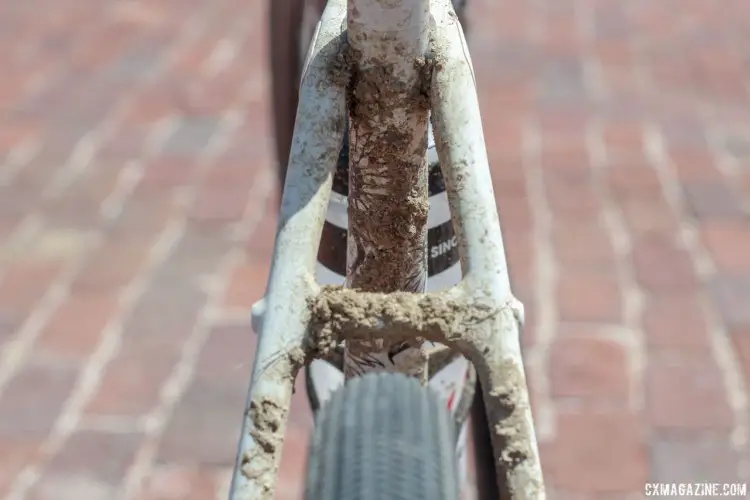
One difference between the Checkpoint and Boone is the addition of a seatstay bridge to the gravel bike. Sven Nys’ 2018 Dirty Kanza 200 Trek Checkpoint. © Z. Schuster / Cyclocross Magazine
In addition to showcasing the Checkpoint frame, Nys was putting in some testing time for Challenge’s tubeless tires on the world’s most famous gravel. After the race, Cyclocross Magazine spoke with Challenge’s Morgan Nicol—who was in Emporia and spoke with Nys after the race—to get the entire story of the Belgian’s day.
Nys started the Dirty Kanza on a set of Challenge 700c x 38mm TLR Gravel Grinder tires. Unfortunately, the Kanza gravel gods had nefarious plans in store for the ’cross legend that not even his bike wizardry could protect him from. Nys flatted on the first big climb when the side of his tread received a 5mm gash from the sharp Flint Hills gravel. Nicol said a number of other riders in the lead group suffered a similar fate, so Nys was not alone in his misfortune. Flats (and worse) are nothing new at the Dirty Kanza, after all.
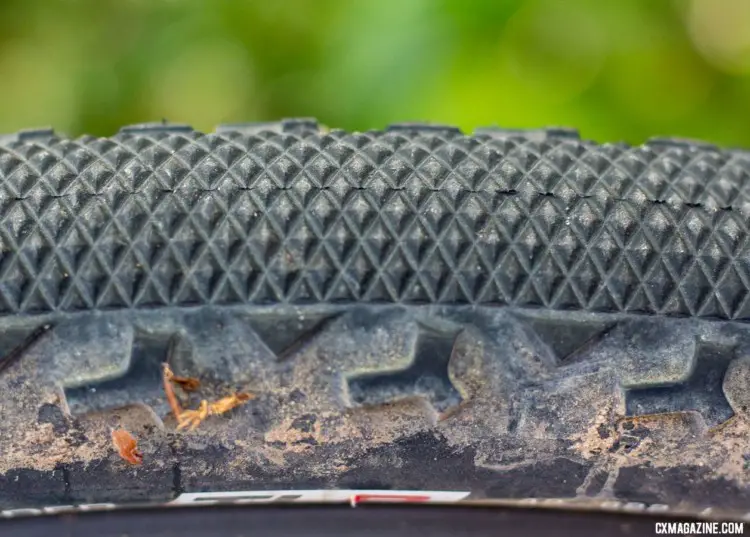
Nys started the race on Challenge Gravel Grinder TLR tires. A photo of our review tire is shown here. © Cyclocross Magazine
When I spoke with Nys after his ride, he said he suffered back-to-back flats. Nicol said Nys elaborated on his experience later on after the haze of jet leg and Kanza gravel settled. “Sven had two more ‘flats,’ or more accurately slow leaks, before the 50-mile checkpoint,” Nichol said. “He stopped but could not find any holes. Reacting quickly, he put tubes in and took off again.”
One additional part of the story is Nys started the race with the new Quarq TyreWiz pressure sensors thanks in part to the urging of a Belgian film crew. Nicol said the new sensors created some troubles for Nys. “The valve stems unscrewed slightly due to the constant impacts of the gravel and slowly deflated the tires,” he said.
Kaitie Keough also ran the sensors with her tires, but did not appear to have the same issues with leaking air as Nys did.
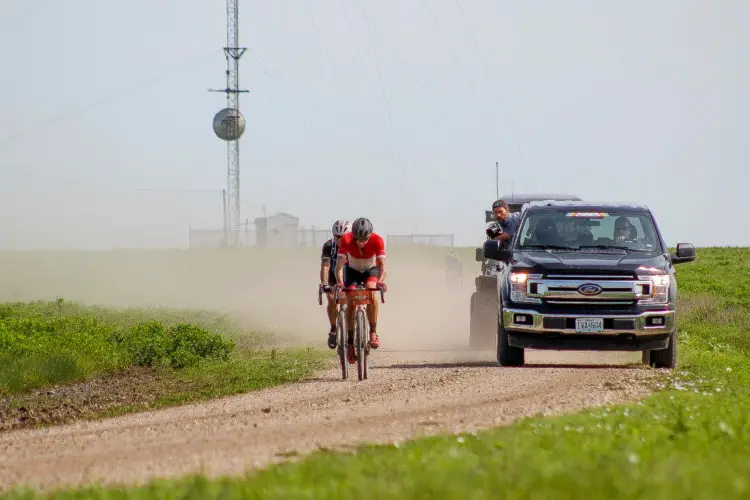
Nys had to chase back after his flats, towing a camera crew and the occasional lucky rider. 2018 Men’s Dirty Kanza 200. © Z. Schuster / Cyclocross Magazine
After repairing the flats, Nys swapped to a new wheelset at Checkpoint 1 that had Bontrager prototype gravel tires and no pressure sensors. When I saw his bike after the race, it had 700c x 40mm GR-1 Team TLR tires mounted up that he ran at 39psi. Studner said Trek expects to release the tires soon.
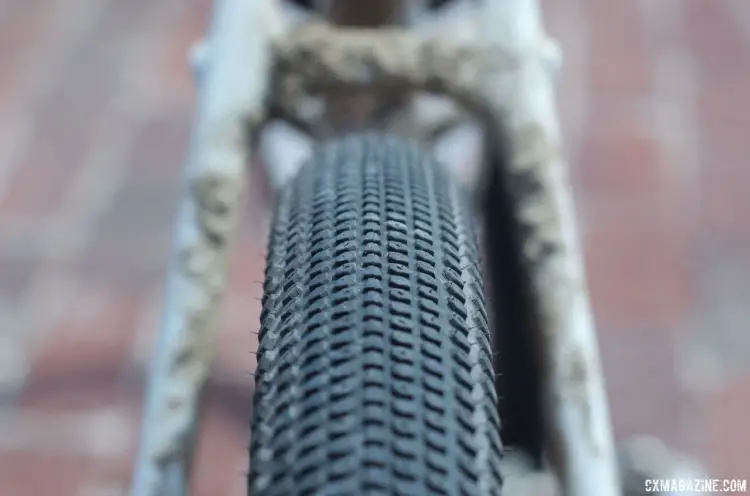
Nys finished on prototype Bontrager GR-1 Team gravel tires that should be available soon. Sven Nys’ 2018 Dirty Kanza 200 Trek Checkpoint. © Z. Schuster / Cyclocross Magazine
Nys’ wheels—or at least the ones he had after Checkpoint 1—were Bontrager’s Aeolus XXX 2 TLR carbon clinchers. The 28mm deep carbon rims have an internal width of 21mm, which helped support Nys’ 40mm-wide tires.
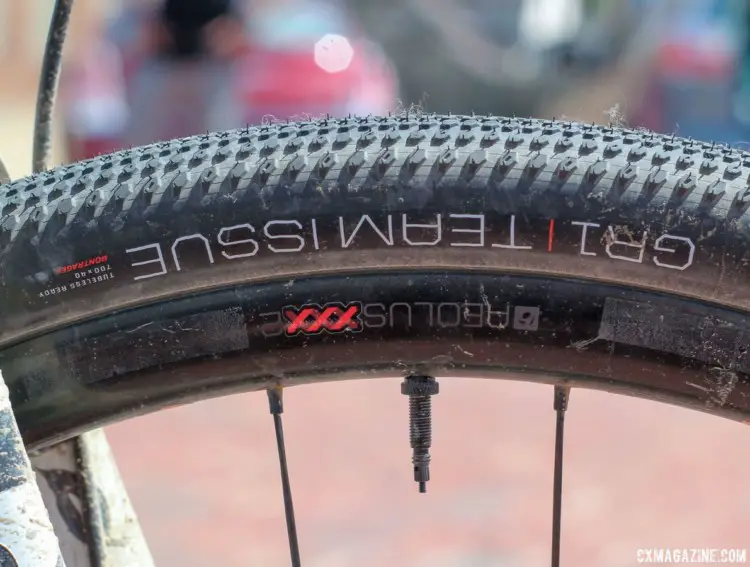
Nys finished his day on prototype Bontrager GR-1 Team gravel tires mounted to Aeolus XXX 2 carbon tubeless clinchers. Sven Nys’ 2018 Dirty Kanza 200 Trek Checkpoint. © Z. Schuster / Cyclocross Magazine
For more on Nys’ Dirty Kanza 200 Checkpoint, see the specs and photo gallery below.
All of our coverage from Kansas is available in our 2018 Dirty Kanza 200 archives.
Sven Nys’ Dirty Kanza 200 Trek Checkpoint Specifications
Frame: Trek Checkpoint SL, OLCV 500 carbon, BB90, 12x142mm thru-axle, internal cable routing, flat mount disc, rear IsoSpeed decoupler, Stranglehold dropouts
Fork: Trek Checkpoint SL, OLCV 500 carbon, 12x100mm thru axle, tapered full carbon steerer, flat mount disc
Shift/Brake Levers: Shimano Dura-Ace ST-R9150 Di2
Brake Calipers: Shimano Dura-Ace BR-R9170
Rear Derailleur: Shimano Ultegra RD-RX805 Di2
Crankset: Shimano Dura-Ace R9100, 50/34t chain rings
Cassette: Shimano 11-28t
Chain: Shimano
Stem: Bontrager
Handlebar: Bontrager Pro IsoCore, carbon
Saddle: Bontrager Serano
Pedals: Shimano XTR PD-M9000 SPD
Wheels: Bontrager Aeolus XXX 2 carbon tubeless clinchers
Tires: Start: Challenge Gravel Grinder TLR, 700c x 38mm; Finish: Bontrager GR-1 Team TLR prototypes, 700c x 40mm
More info: trekbikes.com
Photo Gallery: Sven Nys’ Dirty Kanza 200 Trek Checkpoint

